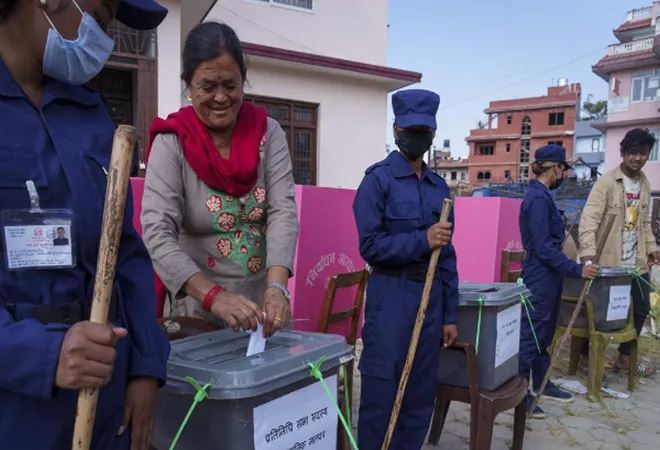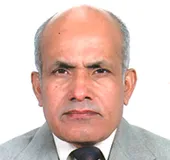-
CENTRES
Progammes & Centres
Location
Nepal’s democracy has been reduced to crude politics which has seemingly caused electoral apathy among its voters

After the promulgation of the Nepalese Constitution in 2015, Nepal for the second time is going to hold the elections of the House of Representatives (HoR), the Nepalese Parliament, along with the elections of the seven provincial assemblies on 20 November 2022. In the 275-member HoR, 165 members will be elected on the basis of the First-Past-the-Post (FPTP) electoral system, while the remaining 110 members will be elected on a proportional representation basis for which a party or the electoral alliance will have to secure a minimum of 3 percent of the total valid votes. In a country with 30 million population, nearly 17 million voters would decide the fate of the candidates in the federal parliament and the provincial assemblies.
The Election Commission of Nepal (ECN) claims that it has made all needed preparations to ensure free and fair elections of the federal parliament and the provincial assemblies. Towards this end, the ECN has also established an institutional mechanism by including cyber experts of the Nepal Police and Nepal Army to discourage any attempt by any quarter to spread disinformation, misinformation, or even hate speeches. Also, the ECN has made a rule whereby the ministers cannot use government resources at federal, provincial, or local levels while campaigning. It has already issued show-cause notices to 71 individuals/institutions for allegedly violating the poll code. The ECN is empowered to impose fines and even annul the candidacies of candidates in case of violation of the poll code of conduct. Reports are also that different election observer groups of Nepal, apart from the European Union (EU) office will be observing the upcoming elections.
Of the 116 registered political parties with the ECN, 84 parties are contesting the elections of the HoR and the provincial assemblies. However, the main contests are between the six-party ruling alliance headed by Prime Minister Sher Bahadur Deuba of the Nepali Congress and the four-party Opposition alliance led by former Prime Minister KP Sharma Oli of the Communist Party of Nepal-Unified Marxist-Leninist (CPN-UML). The ruling alliance comprises the Nepali Congress, the Communist Party of Nepal (Maoist-Centre), the Socialist Party of Nepal, the Communist Party of Nepal (Unified Socialist), the Loktantrik Samajwadi Party, Nepal and the Rashtriya Janamorcha; while the opposition alliance comprises CPN-UML, Nepal Pariwar Dal, Rashtriya Prajatantra Party, Nepal and Janata Samajbadi Party.
Because of the alliance politics, different political parties had to compromise seats. Many established leaders, thus, could not get party tickets to contest the elections, causing several leaders to quit their parties in protest and contest the elections as rebel independent candidates.
In the 2017 elections, the left alliance of the CPN-UML and the CPN (Maoist-Centre) had swept the polls by winning 116 of 165 seats on the FPTP electoral system in the federal parliament against the main Opposition Nepali Congress which could win merely 26 seats, though the percentage of votes to the left wing was only 10 percent more. Besides, the two communist parties were also able to win most seats in the provincial assemblies and thus they were successful in forming governments in six out of the seven provinces. But then because of the internal rifts among the political leaders, Madhav Kumar Nepal and Pushpa Kamal Dahal broke from the CPN-UML and joined the six-party ruling alliance.
Because of the formation of two electoral alliances, the space left for party cadets to contest elections was reduced considerably. For example, in the ruling electoral alliance, the Nepali Congress kept only 90 of the 165 seats for itself and has given Pushpa Kamal Dahal-led Communist Party of Nepal (Maoist-Centre) 47 seats; Madhav Kumar Nepal-led Communist Party of Nepal (Unified Socialist) 19 seats; Mahanth Thakur-led Loktantrik Samajbadi Party seven seats, and the Rashtriya Janamorcha two seats. Because of the alliance politics, different political parties had to compromise seats. Many established leaders, thus, could not get party tickets to contest the elections, causing several leaders to quit their parties in protest and contest the elections as rebel independent candidates.
In electoral alliance politics in Nepal, ideology has been rendered meaningless. Had it not been so, how could a democratic party such as the Nepali Congress form an electoral alliance with the ultra-left Maoist party or even the anti-federalist Samyukta Janamorcha? How could the CPN-UML join hands with a pro-Hindu and pro-monarchical party like Rashtriya Prajatantra Party? How could the pro-Madhesh Janata Samajbadi Party which was at logger’s heads with the CPN-UML during the Madhesh movement in 2015-16 ally with it? How is it that the two Madhesh-based parties, instead of forming a natural alliance between themselves, are tagging along with either the ruling alliance or the Opposition alliance?
Each of the political parties in the ruling and opposition alliances came out with their individual electoral manifestoes, which added confusion among the voters.
If ideology continued to play a key role, the constituents of the ruling alliance and the opposition alliance would have come up with only two distinct election manifestoes. They could have tried to project how they differed from each other on domestic or even foreign policy issues. That could have helped the voters judge which of the two alliances could better serve their interests. Rather than doing that, each of the political parties in the ruling and opposition alliances came out with their individual electoral manifestoes, which added confusion among the voters.
In the ruling alliance, the Nepali Congress in its election manifesto has not made any commitment to secularism because several senior leaders of the party are in favour of making Nepal a Hindu state. But at the same time, the Maoist party despite being a constituent of the ruling alliance has exhibited strong allegiance to the agenda of secularism. It is an irony that on the issue of making Nepal a Hindu state, RPP which is in the opposition alliance is more vocal in advocating for this cause.
Moreover, the pro-monarchical RPP, in its election manifesto, wants to scrap the provinces, but the CPN-UML and other political parties in the opposition alliance hardly endorse this stand even though the provinces over the last five years delivered very little.
Because of the lack of trust in the leaders, the voters have become reluctant and even passive in casting votes in the upcoming elections. Such signs do not augur well for democracy in Nepal.
Also, the main Opposition CPN-UML in its election manifesto pledged to resolve the long-standing citizenship issue within six months of forming the government. But President Bidya Devi Bhandari, who was a senior leader of the CPN-UML, did not certify the Citizenship Amendment Bill which was passed by both the Houses of the Nepalese parliament. The expectation was that the Bill could have resolved the citizenship issue which does not allow the children of those receiving citizenship by birth to get citizenship by descent.
Because all the major political parties have joined either the ruling alliance or the Opposition alliance, the chances for any other political party to emerge as a challenging force are miniscule. If the mandate given by the people during the local level elections in May last for 753 rural municipalities/ municipalities is any proof, it appears that the Nepali Congress along with the Maoist party will fare far better this time in the federal parliament as well as in the provincial assembly elections. The losers to some extent would be the CPN-UML and the two Madhesh-based political parties.
What, however, is striking is the growing confusion and frustrations among the voters for the way the leaders of the two electoral alliance groups have sacrificed ideologies simply for power. They are also worried about the fact that the development agendas and political guidelines in the election manifestos seem to be a farce. Because of the lack of trust in the leaders, they have become reluctant and even passive in casting votes in the upcoming elections. Such signs do not augur well for democracy in Nepal.
The views expressed above belong to the author(s). ORF research and analyses now available on Telegram! Click here to access our curated content — blogs, longforms and interviews.

Hari Bansh Jha was a Visiting Fellow at ORF. Formerly a professor of economics at Nepal's Tribhuvan University, Hari Bansh’s areas of interest include, Nepal-China-India strategic ...
Read More +